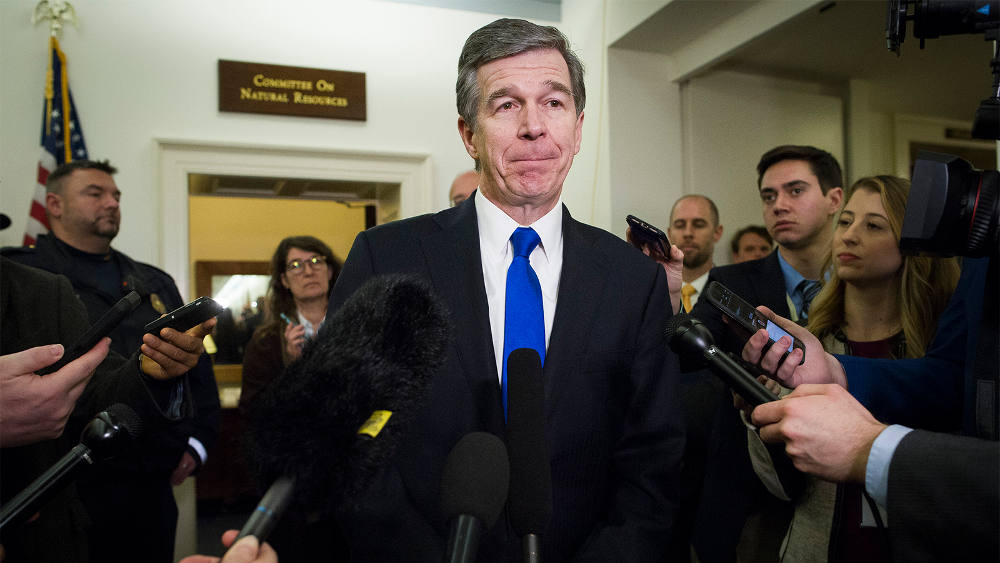
North Carolina Gov. Roy Cooper speaks with reporters on Capitol Hill in Washington, on Feb. 6, 2019. (RNS/AP Photo/Cliff Owen)
North Carolina has became the first Southern state to ban public funding of conversion therapy for minors, the practice often used by religious groups to “cure” individuals of their same-sex sex orientations and transgender identities.
In his executive order on Friday (Aug. 2), Gov. Roy Cooper instructed the North Carolina Department of Health and Human Services to make sure state licensed health care providers and organizations that use such techniques are not paid by government agencies.
Eighteen states plus the District of Columbia have laws that ban conversion therapy of minors by licensed health care providers, but Southern states have been unable to muster the votes to pass legislation to ban the practice, even as polls show growing support for such legislation.
“The dynamic we’re contending with in many parts of the South is that even when we see very strong public support for an issue and legislators ready to introduce a bill and push for it, the Republican majority leadership in state legislatures is putting up barriers to bills like this progressing,” said the Rev. Jasmine Beach Ferrara, executive director of the Campaign for Southern Equality, which works to strike down anti-LGBTQ laws and pass pro-LGBTQ policies across the South.
North Carolina has a bill pending in its legislature that would ban conversion therapy, but with passage stalled by a Republican majority, Cooper, a Democrat, chose to use an executive order.
North Carolina joins Utah as the only other state to curb the practice through executive order. In June, after the Utah legislature failed to agree on a bill, Gov. Gary R. Herbert issued a letter directing the state psychologist licensing board to “ethically regulate psychological interventions for minor children regarding their sexual orientation or gender identity."
Executive orders can’t stop the private practice of conversion therapy. Some religious groups across the state continue to use what's sometimes known as “ex-gay therapy,” to treat youth who have same-sex attraction.
One group called New Beginning Support, in the Asheville-Hendersonville area of North Carolina, says on its website that it does not have licensed professional counselors but rather Christian life coaches and mentors “who understand the complexities of sexuality and gender identity issues.”
"It is also our goal to help you come to truly accept and love yourself, as He created you, as well as the love and grace your Heavenly Father has for you, in a way that brings abundant life and freedom," the website says.
Advertisement
Tami Fitzgerald, executive director of the North Carolina Values Coalition, a socially conservative organization, was quoted saying the executive order was “one of the most blatant attacks of this governor on the First Amendment rights to freedom of speech and freedom of religion.”
The movement to ban conversion therapy began in 2012, when California passed the first conversion therapy law ban for people under the age of 18. In 2013 and 2014, New Jersey and Washington D.C. enacted similar laws. In 2015 to 2017, another seven states followed.
The American Psychological Association, the American Medical Association and a host of other health care groups, including the American Academy of Pediatrics, the American Counseling Association, the National Education Association and the National Association of School Psychologists, have issued statements opposing the practice. All claim an array of harms are associated with conversion therapy, including anxiety, depression and suicide.
An estimated 698,000 LGBT adults in the U.S. have received conversion therapy at some point in their lives, according to the Williams Institute at the U.C.L.A. School of Law. The institute conducts independent research on sexual orientation and gender identity law and public policy.
Despite the lack of statewide bans on conversion therapy, several Southern cities and municipalities, especially in Florida, have gone ahead and banned the practice. Among them: Boca Raton, Gainesville, Miami, Palm Beach and Tampa.
In a poll of North Carolinians conducted by Public Policy Polling in February, 80% of all polled respondents said they think “conversion therapy” should be illegal on children under 18.




